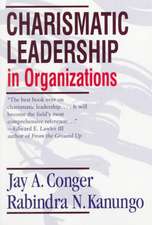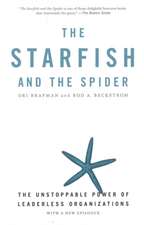Organizations: Social Systems Conducting Experiments
Autor Jan Achterbergh, Dirk Vriensen Limba Engleză Paperback – 17 sep 2010
Preț: 889.71 lei
Preț vechi: 1085.01 lei
-18% Nou
Puncte Express: 1335
Preț estimativ în valută:
170.30€ • 185.05$ • 143.14£
170.30€ • 185.05$ • 143.14£
Carte tipărită la comandă
Livrare economică 21 aprilie-05 mai
Preluare comenzi: 021 569.72.76
Specificații
ISBN-13: 9783642143151
ISBN-10: 3642143156
Pagini: 392
Ilustrații: XII, 391 p. 73 illus.
Dimensiuni: 155 x 235 x 28 mm
Greutate: 0.56 kg
Ediția:2nd ed. 2010
Editura: Springer Berlin, Heidelberg
Colecția Springer
Locul publicării:Berlin, Heidelberg, Germany
ISBN-10: 3642143156
Pagini: 392
Ilustrații: XII, 391 p. 73 illus.
Dimensiuni: 155 x 235 x 28 mm
Greutate: 0.56 kg
Ediția:2nd ed. 2010
Editura: Springer Berlin, Heidelberg
Colecția Springer
Locul publicării:Berlin, Heidelberg, Germany
Public țintă
ResearchDescriere
to do to ensure survival, and (2) principles for designing organizational structures in such a way that they can realize the required functions adequately. In the course of their elaboration, we will show that these principles are general – i.e., that they hold for all organizations. 1.5 Conceptual Background To describe organizations as social systems conducting experiments and to present principles for designing an infrastructure supporting the “social experiment,” we use concepts from (organizational) cybernetics, social systems theory, and Aristotle’s ethics. In this book, we hope to show that concepts from these traditions – as introduced by their relevant representatives – can be integrated into a framework supporting our perspective on organizations. To this purpose, we introduce, in each of the following chapters, relevant concepts from an author “belonging” to one of these three traditions and show how these concepts contribute to describing organizations as social experiments (in Part I of the book), to formulating principles for the design of functions and organization structures supporting meaningful survival (Part II), and to formulating principles for the design of organization structures enabling the rich sense of meaningful survival (Part III). Of course, the relevance of cybernetics, social systems theory and Aristotle’s ethics can only be understood in full, after they have been treated in more detail – but based on what we said above, it may already be possible to see why these theories have been chosen as conceptual background.
Cuprins
Introducing Organizations as Social Systems Conducting Experiments.- Introducing Organizations as Social Systems Conducting Experiments.- The experimental and social arche of organizations.- The Experimental Arche: Ashby’s Cybernetics.- The Experimental Arche Continued: Von Foerster on Observing Systems.- The Social “arche,” Organizations as Social Systems: Luhmann.- Epilogue to Part I: The Two “Archai” Combined.- Designing Organizations as Social Systems Conducting Experiments.- Beer: Functional Design Principles for Viable Infrastructures.- Specific Design Principles: de Sitter’s Organizational Structures.- Epilogue to Part II: functional and specific design principles.- Poor and Rich Survival.- Poor Survival: Disciplining Organizational Behavior.- Towards Rich Survival: Aristotle.- Organizational Structures Supporting Rich Survival.- Epilogue.
Textul de pe ultima copertă
What are organizations? What is their point? How should one design successful organizations?
Although these questions have been treated by many authors in many different ways, this book offers a new perspective. In a nutshell, the book combines cybernetics, social systems theory and Aristotle’s ethics to describe organizations as "social systems conducting experiments with their survival" and to formulate principles for their design. In Part I, the authors argue that ‘experimenting’ and ‘social interaction’ are key features of organizations. In order to survive, organizations continuously have to experiment with goals, infrastructures and transformation processes and this experiment is an inherently social activity.
In Part II principles are given guiding the design of organizational infrastructures.
In Part III Aristotle’s ethics, cybernetics and social systems theory are instrumental to describe and derive design principles required for social responsibility.
(1st Ed.)
Although these questions have been treated by many authors in many different ways, this book offers a new perspective. In a nutshell, the book combines cybernetics, social systems theory and Aristotle’s ethics to describe organizations as "social systems conducting experiments with their survival" and to formulate principles for their design. In Part I, the authors argue that ‘experimenting’ and ‘social interaction’ are key features of organizations. In order to survive, organizations continuously have to experiment with goals, infrastructures and transformation processes and this experiment is an inherently social activity.
In Part II principles are given guiding the design of organizational infrastructures.
In Part III Aristotle’s ethics, cybernetics and social systems theory are instrumental to describe and derive design principles required for social responsibility.
(1st Ed.)
Caracteristici
Revised edition now in softcover.
One of the first books to combine cybernetics and social systems theory.
Provides a set of principles for designing socially responsible organizations.
Includes supplementary material: sn.pub/extras
One of the first books to combine cybernetics and social systems theory.
Provides a set of principles for designing socially responsible organizations.
Includes supplementary material: sn.pub/extras


















